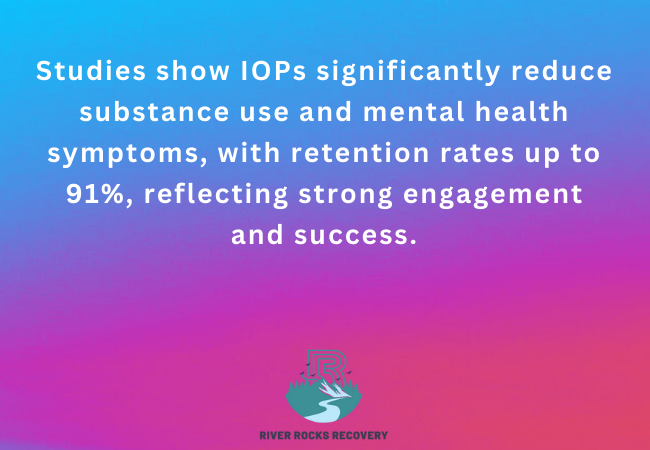The transition from inpatient rehab to independent living marks a pivotal turning point in addiction recovery. It’s a time filled with both hope and uncertainty—a phase where individuals begin applying the tools they’ve acquired in treatment to real-world situations. However, without continued support, many people struggle with relapse, emotional overwhelm, or isolation. That’s where an Intensive Outpatient Program (IOP) becomes a lifeline.
At River Rocks Recovery, our Intensive Outpatient Program in Ohio provides the structure, therapy, and flexibility needed to bridge the gap between full-time residential care and fully independent living. Whether you’re recovering from opioids, methamphetamine, alcohol, or polysubstance abuse, IOP can help you stabilize, grow, and thrive in your post-rehab life.
What Is an Intensive Outpatient Program (IOP)?
An IOP is a form of addiction treatment that combines structured therapy with the freedom to live at home or in sober living. It’s designed for individuals who are medically stable but still need clinical oversight, therapeutic guidance, and peer support to prevent relapse and ease the transition into the real world.
IOP Services at River Rocks Recovery Include:
- 9–15 hours of weekly treatment across 3–5 days
- Individual therapy sessions
- Group counseling and peer support
- Family therapy and education
- Dual diagnosis mental health support
- Access to Medication-Assisted Treatment (MAT)
- Personalized relapse prevention planning
- Life skills training and case management
Why the Transition Phase Is So Critical
Leaving the safety of an inpatient or Partial Hospitalization Program in Ohio introduces new challenges:
- Freedom without accountability
- Exposure to old environments and triggers
- Rebuilding family dynamics
- Returning to school, work, or financial obligations
- Managing emotional ups and downs without 24/7 care
These stressors can derail recovery without ongoing guidance and therapeutic support.
How IOP Supports Independent Living After Rehab
1. Sustained Structure and Daily Routine
Recovery thrives in consistency. IOP maintains a daily or weekly treatment schedule, reinforcing:
- Healthy habits
- Time management
- Sleep hygiene
- Balanced nutrition and self-care routines
This structure offers a safety net without being overly restrictive, allowing you to gradually regain autonomy.
2. Real-Time Application of Recovery Tools
Unlike inpatient treatment, where triggers are mostly theoretical, IOP enables clients to:
- Face real-world challenges during evenings and weekends
- Test coping skills in real situations
- Reflect on experiences in therapy the next day
- Adapt strategies with clinical guidance
This learn-apply-adjust model helps solidify behavioral change and promotes personal insight.
3. Relapse Prevention with Expert Support
IOP focuses on recognizing high-risk scenarios and developing action plans before relapse occurs. This includes:
- Identifying personal relapse triggers
- Learning healthy outlets for stress and emotion
- Practicing boundary setting
- Managing social pressures
- Developing emergency support protocols
Our therapists work with you to build a customized relapse prevention toolkit that adapts as you progress.
4. Continuing Care for Mental Health Needs
Clients with co-occurring disorders—such as depression, anxiety, or PTSD—are especially vulnerable during early recovery. At River Rocks Recovery, IOP includes:
- Dual diagnosis treatment
- Psychiatric evaluations and medication management
- Trauma-informed therapy
- Supportive therapies like mindfulness and CBT
Addressing both addiction and mental health simultaneously leads to better stability and long-term outcomes.
5. Reintegrating Family and Social Support
Rebuilding relationships is critical. IOP offers:
- Guided family therapy
- Psychoeducation for loved ones
- Communication workshops
- Tools for rebuilding trust, managing conflict, and setting boundaries
Our Addiction Treatment Program in Ohio recognizes that recovery is stronger when the family heals together.
Overcoming Barriers to Independence Through IOP Support
While many clients are eager to regain independence, real-world responsibilities can feel overwhelming without support. IOP helps address and overcome common barriers:
Financial Insecurity
- Access to job readiness training
- Help building resumes and preparing for interviews
- Budgeting and money management workshops
- Case management for employment services and housing resources
Lack of Sober Community
- Peer support groups
- Referrals to sober living environments
- Alumni events and aftercare planning
- Social skill-building workshops
Fear of Failure or Relapse
- Supportive, non-judgmental therapeutic space
- Tools for overcoming shame, guilt, and perfectionism
- Step-by-step goal setting to build confidence
Transportation and Scheduling Challenges
- Flexible IOP scheduling (morning/evening options)
- Coordination with work, childcare, and school
- Help accessing transportation services, if needed
At River Rocks Recovery, we design IOP plans that address the full scope of your real-world needs, not just the clinical ones.
Who Benefits Most from IOP?
IOP is ideal for individuals who:
- Have completed residential rehab or Partial Hospitalization Program in Ohio
- Are medically and emotionally stable
- Live in a safe, supportive environment
- Need flexibility to return to work or school
- Want ongoing care without stepping away from life
- Require MAT support (Suboxone, Vivitrol, etc.)
- Need continued mental health treatment alongside addiction care

How IOP Fits into Our Full Continuum of Care
At River Rocks Recovery, your recovery is never “one and done.” We walk with you every step of the way:
- Detox and medical stabilization
- Residential inpatient rehab
- Partial Hospitalization Program in Ohio (PHP)
- Intensive Outpatient Program in Ohio (IOP)
- Outpatient Program in Ohio (OP)
- Aftercare planning, alumni events, and ongoing support
Each level is designed to build on the last—a scaffold for lasting transformation.
Why Choose River Rocks Recovery for IOP in Ohio
At River Rocks Recovery, we believe real recovery begins when individuals are empowered to live life with confidence, purpose, and support. Our Intensive Outpatient Program in Ohio bridges the gap between treatment and independence by providing a structured, flexible, and client-centered approach.
Here’s what makes River Rocks Recovery a trusted Addiction Treatment Center in Ohio:
Customized Care Plans
Each client receives a personalized treatment plan tailored to their goals, needs, history, and progress. Whether you’re stepping down from inpatient care or returning after a relapse, our approach is built around your life.
Flexible Scheduling for Real-Life Balance
We offer morning and evening IOP options, allowing clients to maintain work, family, or school responsibilities while prioritizing their recovery.
Expert Dual Diagnosis Support
Our clinicians are trained to treat both addiction and co-occurring mental health disorders. From anxiety and depression to trauma and PTSD, we treat the whole person—not just the addiction.
Medication-Assisted Treatment (MAT) Integration
Clients in our Opiate Rehab Treatment in Ohio or Alcohol Rehab Treatment in Ohio may benefit from MAT options like Suboxone or Vivitrol, supported by clinical and therapeutic care.
Sober Living and Community Referrals
We work with respected sober living homes and local support organizations to ensure that every client has a safe, recovery-focused environment outside of treatment hours.
A Full Continuum of Care
From detox to aftercare, we offer every level of addiction treatment, including Partial Hospitalization Program (PHP), Intensive Outpatient Program (IOP), and Outpatient Program (OP). Wherever you are in your journey, we have a program to support you.
Conclusion
Reintegrating into daily life after rehab is a critical phase of recovery. It can also be one of the most vulnerable times without continued support. With a strong foundation and ongoing care, however, this transition becomes an opportunity for personal growth and long-term success.
At River Rocks Recovery, our Intensive Outpatient Program in Ohio offers the guidance, structure, and clinical expertise you need to move forward confidently. Whether you’re returning to work, reconnecting with family, or rediscovering your purpose, our IOP will help you navigate life after rehab with the strength and tools you’ve worked hard to build.
Call us today at 888.905.6281 to learn more or schedule a confidential assessment to explore our IOP and full range of Addiction Treatment Programs in Ohio. You’ve come this far. Let River Rocks Recovery help you take the next step with clarity and support.
FAQ – IOP and Transitioning from Rehab
How does IOP help with the transition to independent living?
IOP gives clients structure, therapy, and accountability while they reintegrate into real life. It helps with relapse prevention, rebuilding routines, job readiness, managing triggers, and maintaining mental health stability.
Who is a good candidate for IOP?
Individuals who are:
-
Leaving inpatient or PHP care
-
Medically and emotionally stable
-
Living in a supportive, sober environment
-
Ready to return to work or school
-
Still needing clinical support but not 24/7 care
How long does an IOP last?
Most IOPs last between 6 to 12 weeks, though duration depends on the individual’s progress and needs.
Does IOP include therapy for mental health issues?
Yes. River Rocks Recovery provides dual diagnosis treatment in IOP, including therapy for conditions like depression, anxiety, PTSD, and bipolar disorder—alongside addiction care.
Is Medication-Assisted Treatment (MAT) available during IOP?
Absolutely. We offer MAT options like Suboxone and Vivitrol as part of our Opiate Rehab Treatment in Ohio and Alcohol Treatment Programs to manage cravings and support long-term sobriety.
Can I work or go to school while in IOP?
Yes. IOP is designed to be flexible. With morning and evening tracks, many clients continue or return to their professional and educational responsibilities while attending treatment.
What happens after IOP?
After IOP, clients can step down to our Outpatient Program in Ohio, engage in aftercare or alumni support, or continue with individual therapy as needed.




























